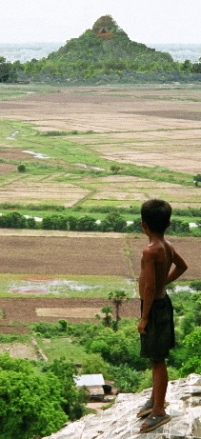As the World Economic Forum concludes, in an editorial on the Huffington Post, my colleague Mark Vlasic and I have urged the political leaders attending Davos to pay heed to an international criminal industry that is costing the world billions in financial losses, and more irreparably, destroying something with no price tag: our cultural heritage.
Right now looters are reducing countless ancient sites to rubble in their search for buried treasures to sell on the art market. The ensuing trafficking of antiquities and other stolen cultural objects reaches every corner of the globe, and experts fear, may be funding organized crime and terrorist groups. It is also a very attractive way to clean “dirty” assets in the face of otherwise strengthened anti-money laundering and counter-terrorism financing laws, which as former United States prosecutor Rick St. Hilaire notes, “are often limited when it comes to the trade in cultural property.”
For these very practical reasons, the U.S. Homeland Security Investigations (HSI), Department of Justice (DOJ), and Federal Bureau of Investigation (FBI) — as well as foreign and international law enforcement such as Scotland Yard and Interpol — are now prioritizing their efforts to fight antiquities trafficking. U.S. agents and attorneys in particular have had a recent string of successes on this front. Just this month the federal government returned $1.5 million worth of plundered statues to India. And last month, it celebrated another victory when Sotheby’s Auction House agreed to repatriate a $3 million masterpiece to Cambodia, which had been hacked by thieves from a sacred temple during the country’s bloody civil war (both stories were reported by Tom Mashberg in the New York Times here and here).
But as Professor Vlasic and I note in our oped:
[T]he U.S. interest in this issue should go beyond fighting crime. By respecting our allies’ past — and their laws — we are also respecting them. As the recent Cambodian and Indian examples show, this is already paying dividends for American relations overseas.
Washington’s partnership with Phnom Penh has been tense at times, and that with New Delhi reached a recent low point in December, when Indian diplomat Devyani Khobragade was arrested, strip searched and then indicted for visa fraud. A month long diplomatic crisis followed, which seemed to end — or at least cool off — only with last week’s repatriation ceremony.
Likewise, the successful resolution of the Sotheby’s case has made front page headlines in the Cambodia Daily and Phnom Penh Post, with top national leaders praising the United States for its efforts to right one of the many wrongs Cambodia suffered during its long war against the Khmer Rouge. Rightly or wrongly, some historians have blamed America for helping to put the genocidal Khmer Rouge in power and keeping them there, which has made this cooperation all the more meaningful. The Cambodian Deputy Prime Minister himself even said of the transfer, “The soul of our ancestors who built the statue will be satisfied.”
Clearly, by doing the right thing here, the United States is benefiting from more than just good karma.
Let’s hope that the U.S. and others — again Scotland Yard and Interpol come to mind — continue their great work in this area. And that still others follow their lead. This is an issue that all governments (and their tax payers) should be able to get behind, whether from the perspective of diplomacy, law enforcement, or just doing the right thing.
And while that, in this era of tightening budgets, is rarely enough to justify any state expenditures, I’d like to close by stressing that fighting the illicit antiquities trade is indeed the right thing. The world’s cultural heritage — whether it be Cambodia’s great temple of Angkor Wat or our own Declaration of Independence — is both our responsibility and legacy. Let’s do whatever we can to make sure we can pass them on to our children, just as they were passed down to us.
Read the full Huffington Post editorial here.
Learn more about the illicit antiquities trade from the University of Glasgow, which is home to Trafficking Culture, a project funded by the European Research Council to better understand (and thus combat) the global trafficking of cultural objects.
